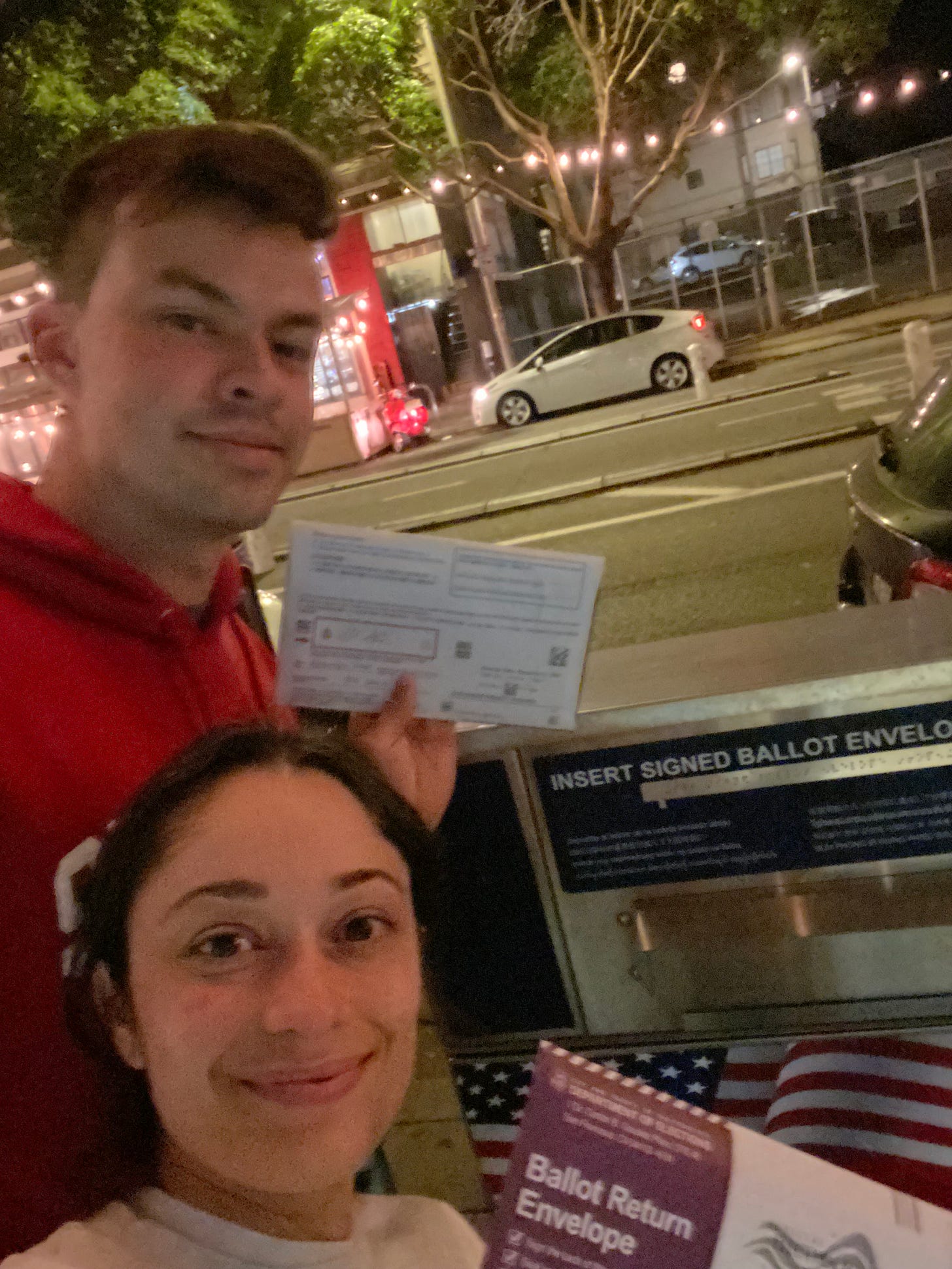How to wake up in a nightmare and keep going
Reflections on the tools we reach for and the patterns we perpetuate amid forces beyond our control
On Monday, July 1 I woke up in an unfamiliar bed. I was on day 3 of dog-sitting for a new friend whose house I had previously never visited and whose dog I hardly knew. I did the thing most people do when they wake up, a thing I have learned over and over again to be antithetical to starting the day on your own terms: I checked my phone.
“Supreme Court Rules That Cities Can Criminalize Sleeping in Public”
“Supreme Court Deals Blow To Trump’s Prosecution, Ruling He Has Broad Immunity”
“Supreme Court Throws Out Chevron Decision, Weakening Federal Regulators”
It is one thing to wake up and fail to recognize the walls of your room; it is another to wake up and fail to recognize the laws of your country. Immediately my head was spinning, the room was spinning, my stomach had hardened into concrete and collapsed into the mattress and through the floor, creating a cavern that even eight hours of sleep could not fortify me from falling into. If it weren’t for the smiling Goldendoodle in the kennel at my feet, I would’ve spent all day fighting the leaden sheets, and I assure you, they would have won.
I am no stranger to this particular type of fight. In high school the primary culprit was sleep deprivation—I had two daily soccer practices to attend, Editor-in-Chief duties to fulfill, AP classes to study for, a sense of self to discover. College was more of the same; the hyper-scheduled life of an over-involved high-achiever, but now with the bonus barriers of parties, group projects, late night roommate hangs on the couch. By the time I worked in consulting, sleep deprivation had simply become a way of life.
In 2021, however, I began waking to a new opponent. It wasn’t just heavy eyelids and warm sheets. Instead: a chilling fog. It was the width of an elephant, the weight of a zoo. It hadn’t appeared at my bedside overnight, but instead must have been marinating in my mattress for months, seeping into my skin, burying into my bones. By the time I understood that this nemesis was unlike the lethargy I had known before, it was too late. The fog had found my spine, followed its fluids to my brain and set to work: dulling so many colors, muting so many sounds, poking so many holes into my worldview that I was no longer Liz, but rather host and home to the darling that is Depression.
On that July day inside that unfamiliar room, that all-too-familiar fog began to seep through the walls. “I know who you are,” I said. I flung the sheets to the other side of the bed and stood up. The dog, who had no idea that our nation’s checks and balances were being eroded on partisan lines, was elated at this first sign of movement: it was time for the day to begin.
I let O out of his kennel and went to grab his leash. To him, this was the opening act of a choreography that is to be faithfully carried out before a morning walk. He, the star of the show, will run around the house while I, the supporting character, indulgently chase after him with bouts of tug-o-war and generous pets before he allows himself to be anointed with the harness.
Usually I love games, but on that particular morning I was stern. Instead of participating in the antics, I sat unmoving on the ottoman. When O calmed down, I would move again to put on the harness. At this he recoiled into play-butt and I would frown, sit, and scroll. “We’re doing this my way, or not at all” I thought, performing an authority role I’d witnessed so many times in childhood.
I sat there, miserable, pretending to read the news until it dawned on me what was happening: I felt powerless, and was mindlessly trying to regain a sense of control by imposing dominance onto the nearest living thing with less power than I. I was reinforcing a hierarchy, perpetuating a pattern. I wasn’t doing it on purpose, but I was doing it nevertheless. I was too caught up in my own storm of frustration to realize that O’s attempts to cajole me into play were actually an invitation to start the day anew, that the leash was a lifeline to return to my body.
Realizing something intellectually, however, is in no way the same thing as embodying its wisdom. And so, I continued to stew in my annoyance until O eventually let me put on the harness and we began our walk.
Once outside, O was busy investigating his surroundings as usual. At this point in the summer I had gone on more than 50 walks and had gotten in the habit of greeting every jasmine plant I walked by. “Hi Jasmine,” I said as we rounded the corner. Even she could tell things were different today; I was just going through the motions.
About halfway through our walk, I suddenly noticed the sound of the birds—had they been chirping this whole time? I started to feel the warmth of the sun on my skin. Shit. Is it, like, a really beautiful day right now? Why am I just now noticing that? Though it was 10 a.m., I experienced my third dawn of the day: at first sight of the fog that morning, my nervous system must have rushed to install its defense, the coping mechanism it learned to rely on so heavily in the past: Numb. It. All.
Fight, flight, or freeze, they say. That is my experience with depression: a complete and total freeze, an absence of the conditions necessary for life. My body will try and return to this state from time to time. I fear, depending on the outcome of the election, tomorrow will be one of them.
However, we are no longer strangers to each other, this fog and I. When she visits, I have learned that she is trying to protect me from a feeling she thinks I cannot handle. To make her go away, I must be brave and bold: I invite my attention, whose gaze is as warm as the sun, to face the very feeling she fears, and together we work to thaw.
The fog is a pervasive cloud of Novocain who mistakes my consciousness for a tooth, but I am the dentist, not the patient, and I have other tools at my table. I have words, trees, movement, play, tears, sleep, time in the sun, antidepressants, dogs, conversation, therapy, stability, love—each of which help me keep my life in motion.
Starting tomorrow, on election day, and for the several days following where we may still be in democratic limbo, I will be using all of these tools in full force. I already have Trump and his supreme court appointees to thank for the fog’s reappearance in July. If Trump is reelected, or if Harris is elected and Trump reattempts to overthrow our democracy, I will not let the fog settle—I hope none of us do. This world depends on our ability to be present, warm, and connected to ourselves and each other in order to keep our lives, and our country, marching ever-forward.

Unbound is a publication by Elizabeth Schasel, born during the liminal eight months between finishing grad school and returning to a corporate job. The goal of Unbound is to live small and slow—read as many books as possible, go on long walks, be silly with friends, and try to figure out how to be in the world in a way that aligns with my values. I invite you to visit the full list of entries below.
Day 11 of the Second Half of Being Unbound (October 24, 2024)
How to wake up in a nightmare and keep going (November 4, 2024) —> (the one you’re on right now)



